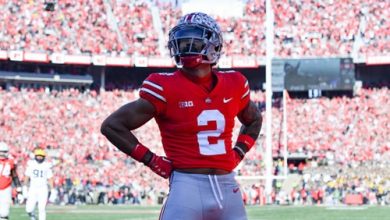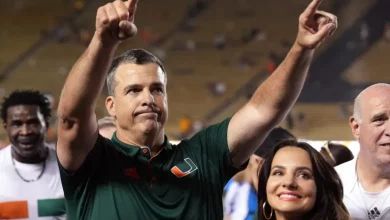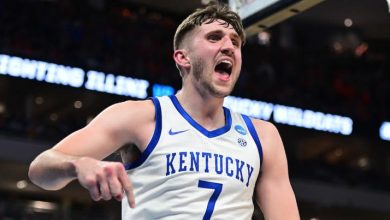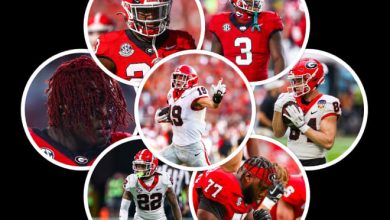The Minnesota Vikings are reportedly linked to Jets QB Aaron Rodgers, sparking speculation about a potential offseason move.

As the NFL offseason begins to take shape, speculation around potential moves, trades, and player acquisitions has started to intensify. One of the most prominent names in the conversation is Aaron Rodgers, the future Hall of Fame quarterback for the New York Jets, whose future in New York has become a topic of significant debate. The Minnesota Vikings, a team that is coming off a promising but ultimately disappointing season, have found themselves frequently linked to Rodgers in rumors and reports leading up to the offseason.
In this article, we’ll examine why the Vikings have emerged as a potential landing spot for Rodgers, what such a move would mean for both teams, and how it could reshape the NFC North landscape. We’ll also take a look at how Rodgers would fit into the Vikings’ system and how much of an impact he could make in Minnesota.
Aaron Rodgers’ Time with the Green Bay Packers
Before we dive into the potential move to the Vikings, it’s important to look at the trajectory of Aaron Rodgers’ career and his time with the Green Bay Packers. Rodgers spent 18 seasons in Green Bay, becoming one of the greatest quarterbacks in NFL history. His accolades speak for themselves: multiple MVP awards, Super Bowl victories, and numerous playoff appearances. Rodgers has built a legacy as one of the most skilled and accomplished quarterbacks in the history of the league.
However, after a turbulent final few years with the Packers that included contract disputes, frustrations with the front office, and growing questions about his future, Rodgers ultimately decided to leave Green Bay. In 2023, he was traded to the New York Jets in a blockbuster deal that shocked the NFL world. Many expected Rodgers to bring immediate success to the Jets, but the move hasn’t exactly gone as planned.
Rodgers’ Time with the New York Jets
Rodgers joined the Jets with high expectations. The team, coming off a promising season with a strong defense and a young offense, believed that Rodgers could be the missing piece that would elevate them to Super Bowl contention. However, the 2023 season with the Jets has been marked by inconsistency and underperformance, with Rodgers struggling to adapt to the offense and injuries hampering his play.
The Jets’ offense never truly clicked under Rodgers, and his struggles to build chemistry with his receivers were evident. As the Jets missed out on the playoffs and fell short of their championship aspirations, questions about Rodgers’ future with the team began to surface.
In the wake of this underwhelming season, speculation about a potential trade has gained traction. The Jets, who have young quarterback talent in Zach Wilson, may look to move Rodgers and his massive contract to another team to free up cap space and build around Wilson. Given that Rodgers will turn 41 in December 2024, some believe that his time in New York may be short-lived, and that his career could come to an end sooner than expected.
Why the Vikings?
The Minnesota Vikings are a team that has been in a constant state of flux when it comes to the quarterback position. While Kirk Cousins has been a solid starter for the Vikings over the past several seasons, his performance in key moments—particularly in the postseason—has raised questions about his ability to lead the team to a championship. Cousins has one more year left on his contract with the Vikings, and despite his consistency during the regular season, there’s an increasing sense that the Vikings need to make a change at the quarterback position if they want to become serious Super Bowl contenders.
The Vikings’ Need for a Superstar Quarterback
The Vikings are an organization with a strong roster and a solid foundation. They boast a dynamic offense with star players like wide receiver Justin Jefferson, running back Dalvin Cook, and tight end T.J. Hockenson. The defense, while not dominant, has been competitive and is expected to improve with better health and coaching. Minnesota has shown that they can compete in a high-powered NFC North, but their limitations at the quarterback position have been exposed in critical moments, especially in the postseason.
While Cousins has put up impressive numbers in the regular season, his inability to elevate his game when it matters most has led to speculation that the Vikings may be better off with a quarterback who can consistently perform in high-pressure situations. Aaron Rodgers, despite his age, would undoubtedly provide the Vikings with that capability.
Rodgers’ pedigree as a two-time MVP and Super Bowl champion gives him the type of experience and leadership that Cousins cannot match. A quarterback with Rodgers’ skill set would instantly elevate the Vikings’ offense and make them a legitimate Super Bowl contender in the NFC. With Jefferson emerging as one of the top receivers in the league and a solid supporting cast around him, Rodgers would have the necessary tools to turn the Vikings’ offense into a top-tier unit.
Rodgers’ Fit with the Vikings’ Offense
When it comes to a quarterback like Rodgers, it’s crucial to consider how he would fit into the offense of his potential new team. The Vikings’ offensive scheme, which is run by head coach Kevin O’Connell, is predicated on play-action passing, misdirection, and creating opportunities for explosive plays down the field. This system is tailored to the strengths of quarterbacks who are comfortable throwing on the move, reading defenses, and making quick decisions in high-pressure situations.
Rodgers, who has excelled in similar systems throughout his career, would likely thrive in this environment. His ability to throw deep balls with precision, especially to a receiver like Justin Jefferson, would give the Vikings one of the most dangerous passing attacks in the league. Additionally, Rodgers’ experience in executing a variety of offensive schemes over the years would allow him to quickly adjust to O’Connell’s system.
One of the areas where Rodgers could make an immediate impact is in his ability to make quick, accurate throws to the perimeter. Jefferson, who is one of the most explosive wide receivers in the league, would likely benefit from Rodgers’ ability to create opportunities on the outside and allow him to make big plays. Pairing Rodgers with a dynamic player like Jefferson could create one of the most potent passing duos in the NFL, giving the Vikings the offensive firepower needed to challenge the NFC’s best teams.
Moreover, Rodgers has a reputation for being an elite decision-maker and avoiding turnovers. The Vikings, who have been plagued by inconsistent play at the quarterback position in recent years, would greatly benefit from having a quarterback who can keep the offense moving without costly mistakes. Rodgers’ ability to keep the ball safe, along with his ability to take risks when needed, would provide the Vikings with a quarterback who can manage the game effectively and win in clutch moments.
The Potential Trade
The idea of the Vikings acquiring Rodgers, however, is not without its challenges. First and foremost, the financial aspect of the deal is a major consideration. Rodgers is still under contract with the Jets, and his deal is worth a substantial amount of money, making it difficult for any team to take on his salary without making other moves to clear cap space. The Vikings, who are currently managing a delicate salary cap situation, would need to find a way to either negotiate a restructure of Rodgers’ contract or trade away players to make room for his salary.
The trade would also require the Vikings to give up significant assets in order to acquire a player of Rodgers’ stature. While the Jets might be willing to move on from Rodgers if they believe it is in their best interest, it’s unlikely that they would part with him for anything less than a high-value package of draft picks and players. The Vikings would likely need to include a first-round pick or two and possibly a player or two to make the deal worthwhile for the Jets.
In addition to the trade talks, the Vikings would need to be prepared for Rodgers’ age and potential injury concerns. While Rodgers has shown he can still perform at a high level, there is always the risk that Father Time catches up with him quickly. The Vikings would need to ensure that they have a solid backup plan in place if Rodgers’ performance begins to dip or if injuries become a concern.
The NFC North Landscape
Acquiring Aaron Rodgers would have a ripple effect throughout the NFC North. The Vikings would instantly become one of the most dangerous teams in the conference with a quarterback like Rodgers at the helm. It would also create an interesting dynamic with the Green Bay Packers, who have spent decades building their team around Rodgers.
With Rodgers potentially leaving the division, it could open up an opportunity for the Vikings to dominate the NFC North for years to come. The Packers, who are in the midst of a rebuilding phase, may take time to adjust to life without Rodgers, giving the Vikings an advantage in the division. The Chicago Bears and Detroit Lions, both of whom have young quarterbacks, will also be looking to improve, but Rodgers’ presence in Minnesota would undoubtedly shift the balance of power in the NFC North.









